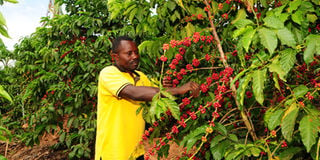Good practices help Muganga increase coffee production

From his 20 acres, Muganga is able to earn about Shs100m a year. PHOTO BY FRED MUZAALE
What you need to know:
- After 10 years as a businessman, Justus Muganga decided to give farming a chance. Fred Muzaale writes.
It is a hot and sunny Thursday afternoon in Kibutamo Village, Sheema District. As I move through the remote village, which is off the Mbarara-Bushenyi highway, I come across a big well-looked after coffee plantation. The garden is literally red with ripe coffee beans. I can tell it is coffee harvesting season.
I am later told by residents that the plantation belongs to Justus Muganga, “a young millionaire”. It is the millions he has earned from his coffee production, that have earned Muganga the millionaire nickname as he is fondly known in the village.
Muganga’s coffee plantation sits on 20 acres and he has a six-acre banana plantation too. He employs 38 workers but his family members do some of the work.
The beginning
Muganga’s success story goes seven years ago. He had been a businessman for 10 years before he decided to switch to coffee growing. To strengthen his ground, he immediately joined Mushanga Sacco so that he could save some of his earnings and at the same time get loans to boost his farming.
The sacco has 19,000 members and it is able to give agricultural loans to farmers because it received a credit facility for onward lending to farmers from the Agricultural Business Initiative (aBi) Trust.
“aBi trust carried out capacity building of all the sacco management and also provided us with motorcycles, which the staff use to reach clients.All these have increased our efficiency,” Gorden Nankunda, the sacco general manager, said.
Muganga says he acquired a Shs5m loan, which he used to buy seedlings, fertilizers and cater for other inputs. Besides the loan, he also received training in proper agronomical practices, post-harvest handling and quality management from the sacco.
“Unlike in business where I had to move up and down looking for clients, agriculture gives me peace of mind as I sell my produce from home,” Muganga says.
Muganga grows elite robusta coffee which he says has high yields of 2,500kg per hectare compared to 700kg per hectare from traditional robusta coffee.
Good agricultural practices
Muganga adds that because of the training he received, he is able to grow his coffee following good agricultural practices.
He says after digging the pits, which are three by two feet, he puts decomposed cow dung, which he mixes with soil. He then waits for two weeks before planting the coffee seedlings in the pits.
When the coffee trees are about two years old, this is when they have started flowering, he applies Nitrogen-Phosphorus and Potassium (NPK). Every twice a year, he sprays -17-17-17 fertiliser (in March and September) on his coffee plants. He says the fertilizer is placed at the base of the stem at the onset of the rains because during the rains, it can easily dissolve in the soil.
To preserve water in the soil and control weeds, Muganga mulches his coffee plantation using coffee husks and dry grass.
Unlike other farmers, Muganga uses wet processing (where water used to move coffee through the process and extract the seed ).
Being one of the model coffee farmers in western region, Uganda Coffee Development Authority (UCDA) last year donated a wet coffee processing machine to Muganga, which he uses to remove the pulp.
By using the wet processing method, he removes the pulp from the coffee cherry soon after harvesting it so that the bean is dried with only the parchment.
The process results in a coffee that is cleaner, brighter and fruitier, hence it fetches a higher price than the one that is dried and then processed.
Market
Because he produces quality coffee beans, Muganga sells parchment coffee at Shs8,000 per kilogramme compared to Shs55,000 for a kilo of dried and processed coffee. He, however, sells a kilo of the same at Shs10,000 to coffee seed bed operators.
Among his buyers is coffee exporting companies such as Kawacom.
UCDA also gave the farmer a solar drier, which he uses to dry his coffee when the weather is bad. From one acre, Muganga earns Shs5m and from his entire 20 acres he bags Shs100m a year.
The millionaire says he uses the coffee husks as fertilizers in the banana plantation so he does not spend money on buying more.
From his banana plantation, he earns about Shs1m a month.
Achievements
Using proceeds from selling his coffee, Muganga says he has constructed rentals in Kampala and Mukono from which he earns about Shs5m per month. He has also bought more land and plots, which he has used to expand his enterprise.
However, his biggest challenge is the long droughts which he says are a result of climate change.
The long drought results in poor yields hence his income is affected.
Muganga advises that farming should be carried out as a family business if it is to be gainful.
About agribusiness
Agricultural Business Initiative (aBi) Trust supports value chain interventions aimed at increasing productivity, improved quality for competitiveness and facilitating market access targeting farmers as the direct beneficiaries.
The interventions promoted include good agricultural practices, post-harvest handling, collective marketing, commercial seed production, entrepreneurship skills, among other things.
“aBi trust has so far extended a credit facility of Shs2b to our Sacco. These funds have increased our loan portfolio to Shs8.6b up from Shs4.3b in 2010 of which 70 per cent of these funds are in agriculture sector. Our loan recovery rate has also improved because we now have good transport, which we use to mobilise members,” Mr Gorden Nankunda, the general manager, Mushanga SACCO, Sheema District




